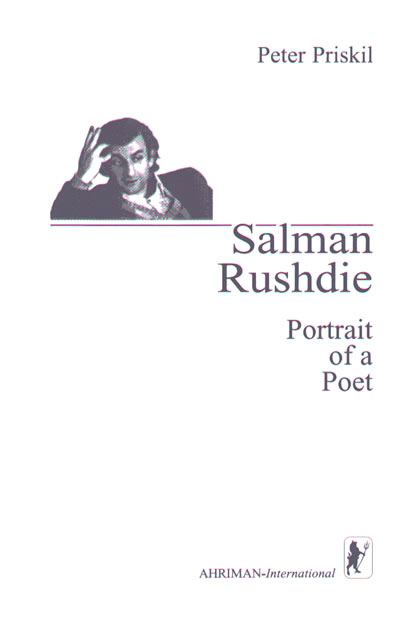Contents
- About this Book
- Salman Rushdie – Portrait of a Poet
- Preface to the Indian Edition
- Introduction
- Short Biography and Work Survey
- The Grotesque Tale – Stylistic Form and Attitude of Mind
- Plots and Protagonists
- The Satanic Verses – a Digression
- The Author and Religion
- The Author and the Barbarians
- Appendix
- The Rushdie Case and the Cowardice of the West
- Book Fair '89: The Most Important Author is not Represented
- From Victim to Fantasized Perpetrator:
Salman Rushdie's deplorable change in his last novel »The Moor's Last Sigh«
- Addendum
- Mani Ratnam's Film »:Bombay«
A Moslem Pogrom in India and its German Adaption or:
On the Merits of Comparison
- Mani Ratnam's Film »:Bombay«
About this Book
The studies on Salman Rushdie and Taslima Nasrin were published as two separate books in Germany. Both had been the first – and for a long time remained the only – publications in defence of the authors threatened with religiously motivated murder. The German media have been boycotting any information about these publications – for reasons that will become obvious to anyone who has read this book. For the following studies do not only deal with literature and art, but above all with their being strangled from religious motives, with their being subordinated to a religious dictate which, in a more and more demanding and malicious manner, is being installed worldwide by Islam and the major Christian Churches on the principle of the division of labour. It can be assumed that the Indian reader was kept largely uninformed as to what perfidious part the West had been playing in this regard, the West which calls itself democratic but, in fact, is lacking any democratic substance (in the first place, the persecutions of political oppositionals on the basis of breaches of the constitution, and, more recently, of members of religious minorities in Germany have to be mentioned here): after it had capitulated without offering any resistance at all to Khomeini's death order, it became the accomplice of religious fanaticism within just a few years; secretly at first, but later openly declaring its support for it. The awarding of one of the highest German prizes for cultural achievements to the propagandist of Islam, Annemarie Schimmel, in October 1995 is a clear signal for the fact that assassinating people because of their criticizing religion has become a standard that is approved of and supported by the West.
This book elucidates the different stages of this development by comparing and contrasting the Western media's reporting with the authors' works – i. e. the authentic literary documents – and the actual events; the media's supposed »plurality« and »objectiveness« thereby reveals to be but the propaganda of a de facto streamlined European press under U.S. tutelage, a propaganda whose tenor might appear astoundingly uniform to any reader who is not used to it.
This attitude of the West is also evidenced in the article about Mani Ratnam's film 'Bombay' which is published as an addendum in this book and was brought out for the first time in the German periodical Ketzerbriefe [Heretics' Letters]. The author has seen the film in Madras in spring 1995 and attentively studied the European media's reporting about the controversy which subsequently arose. The analysis proves that the West, by supporting religious fanaticism, does not only work on the Final Solution in the matter of freedom of speech, but is simultaneously pursuing concrete political aims of immediate interest: such as the destruction of the multiethnic state of India through breaking it up along its confessional borders (like in the case of Yugoslavia) by the purposeful, selective fostering of Muslim separatists by means of propagandistic, financial and – via the neighbouring »ally« Pakistan – military aid.
The struggle for freedom of speech, which is in utmost danger of being liquidated, is the central issue of this book. This essential right, fought for and secured in France 200 years ago, which has meanwhile been eroded and is being eliminated step by step, constitutes the very basis of all other Human Rights; to protect it against any interference by religion or state is the first and foremost purpose of this book.
December 1995
Peter Priskil
»A whole chapter is devoted to the ›Satanic Verses‹, a work in the face of which quite a number of professional reviewers had laid down their arms because they were unable to make head or tail of the jungle of fantasies and allusions ... No doubt, the explanations given in the study are of great benefit for the understanding of the novel, and re-reading it afterwards is worthwhile.«
D'LETZEBURGER LAND, Luxemburg
Peter Priskil:
Dr. Peter Priskil is a historian and literary scholar in Freiburg. He worked for many years as an editor and translator in a scientific publishing house, specializing in medieval studies and Paleolithic art. Since the recent aggressions of the United States, he has spent several periods of time in Iraq and the former Yugoslavia, starting in 1992. Another focus of his work is the application of authentic psychoanalysis to various fields of the so-called humanities.
Major works: Die Karmaten (The Qarmatians), Der verdrängte Humanismus (The Suppressed Humanism), Freuds Schlüssel zur Dichtung (Freud’s Key to Poetry), Der Kalte Krieg (The Cold War).
To the personal homepage of Peter Priskil
Peter Priskil has published numerous articles in the journals Ketzerbriefe and System ubw.
Peter Priskil
Salman Rushdie – Portrait of a Poet
Ahriman-International
Freiburg 1997
224 p.
€ 12,-
ISBN: 978-83-911763-4-4
ISBN-10: 83-911763-4-7


